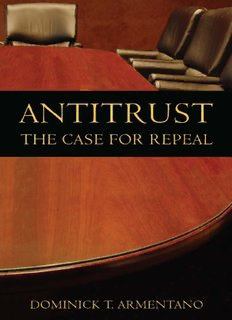
Antitrust : The Case for Repeal - Ludwig von Mises Institute PDF
Preview Antitrust : The Case for Repeal - Ludwig von Mises Institute
ANTITRUST THE CASE FOR REPEAL DOMINICK T. ARMENTANO REVISED 2ND EDITION Ludwig von Mises Institute Auburn, Alabama All rights reserved. Writtenpermissionmustbe secured from the publisherto use orreproduce anypartofthisbook, exceptforbriefquotations incriticalreviews orarticles. The publisherhas attempted throughoutthisbook to distin guishproprietarytrademarksfrom descriptivetermsbyfol lowingthe capitalizationstylesusedbythemanufacturers. Firstedition,titledAntitrustPolicy: The Casefor Repeal, origi nallypublishedbythe CatoInstitute,1000Massachusetts Avenue,Washington,D.C. 2001. Copyright© 1999bythe LudwigvonMises Institute Reprinted in2007bythe LudwigvonMises Institute LudwigvonMises Institute,518WestMagnolia Avenue, Auburn, Ala. 36832;www.mises.org ISBN: 978-0-945466-25-3. Contents Preface vii Introduction: An Antitrust Overview xi 1. The Antitrust Assault on Microsoft. l 2. The Case Against Antitrust Policy 13 3. Competition and Monopoly: Theory and Evidence 31 4. Barriers to Entry 51 5. Price Discrimination and Vertical Agreements 69 6. Horizontal Agreements: Mergers and Price Fixing 81 7. Antitrust Policy in a Free Society 99 Index 107 iii People ofthe same trade seldom meettogether, even for merriment and diversion, but the con versation ends in aconspiracy against the public, or in some contrivance to raise prices. It is impos sible, indeed, to prevent such meetings, by any law which either could be executed/ or would be consistent with liberty and justice. But though the law cannot hinder people of the same trade from sometimes assembling together, it ought to do nothing to facilitate such assemblies; much less render them necessary. -Adam Smith The Wealth ofNations v Preface The flurry offederal and state antitrust activity againstfirms such asToys "R" Us, Staples, Intel, and Microsoft may signal the beginning of an unfortunate new era in enforcement. Antitrust regulation, like a relentless Terminator, is back in business and the economic havoc it threatens is consider able. My position on antitrust has never been ambiguous:All of the antitrust laws and all of the enforcement agency authority should be summarily repealed. The antitrust appa ratus cannot be reformed; it must be abolished. Itis said that much is risked in calling for repeal. Any call for repeal is likely to galvanize those interests committed to areturn to the old-style, traditional enforcementpolicies. In addition, the antitrust "establishment"-attorneys, consult ants, antitrust agency bureaucrats-would probably step up its attack on those who intend, from its perspective, to fur ther "weaken" antitrust policy. Abolitionists would again be portrayed as pro-business and anti-consumer, devoid of any concern for consumer welfare or economic fairness. The mostserious danger, presumably, would be that aprin cipled opposition to all antitrust could delay important antitrust reforms or even reverse some of the slight admin istrative reforms already achieved. Similarly, any serious movement to repeal is said to run the risk of alienating the support of those critics of tradi tional policymostresponsible forthe modestantitrustreforms thatwe have seen to date.The majorityofimportantantitrust vii Antitrust:The CaseforRepeal critics do not support the repeal of antitrust laws; in their view, there is an appropriate role for antitrust policy in a free-market economy, although one that is reduced in scope from the traditional understanding. They would argue that antitrust is still necessary for combating cartels, very large horizontal mergers, and bona fide predatory practices. Iemphatically disagree.There certainly are risks in work ing for repeal, but there are even greater risks in not push ing the intellectual argument against antitrust to its logical conclusion. I will argue that the case against antitrust reg ulation-any antitrust regulation-is far stronger than even its most important critics are willing to acknowledge. I will argue that the employment of antitrust, even against private horizontalagreements, cannotbejustified byanyrespectable general theory or empirical evidence. But even more practi cally, I will argue that the very modestadministrative reforms that we have seen can only be temporary. They were, after all, only administrative reforms, and we have already fallen back into the quagmire of more traditional enforcement policies. The greater risk would be to remain content with some modest "reform" agenda while leaving the entire antitrust institutional structure of private litigation, agency enforcement, and courtreview essentially in place. Itwould be far better in an entirely practical sense to abolish all of these institutional arrangements and simply be done with the greater risk. Many of the arguments Idevelop and cases , discuss in this book will be familiar to readers of my Antitrust and Monopoly.1 New readers who find these ideas stimulat ing-or infuriating-may wish to pursue some of them in greater depth elsewhere.2 I intend, with this revised edition 1DominickT. Armentano, AntitrustandMonopoly:AnatomyofaPolicyFailure, 2nded.(Oakland,Calif.:IndependentInstitute, 1990). 2Robert H. Bork, TheAntitrustParadox:A PolicyatWarwith Itself(NewYork: Basic Books, 1978);·Yale Brozen, Concentration, Mergers, and Public Policy (New viii Preface ofAntitrust:The Case for Repeal, to reach awider audience and to promote agreater public understandingofthe case against antitrust regulation. Such an understanding still appears necessary. York:Macmillan, 1982); Fred L. Smith, Jr., "Why Not Abolish Antitrust?" Regulation 7 (january/February 1983):23-28; Frank H. Easterbrook, "The Limits ofAntitrust," Texas LawReview63(August1984):1-40;FredS.McChesney,"law'sHonorLost:ThePlight ofAntitrust,"AntitrustBulletin31 (1986):359-82;WilliamShughartII,TheOrganization ofIndustry (Homewood, III.:Richard D. Irwin, 1990); and Fred S. McChesney and William F.ShughartII,TheCausesandConsequencesofAntitrust(Chicago:University ofChicagoPress, 1995). ix
Description: